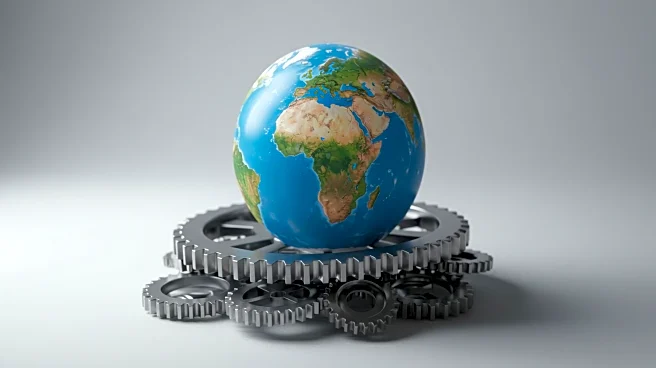What's Happening?
The global economic growth rate is projected to decline from 3.1% in 2024 to 2.9% in 2025, largely due to the reimplementation of protectionist trade policies by the United States under President Trump. According to a report by Euromonitor International, these policies could lead to a significant increase in global inflation, potentially reaching 5.3% in 2025. The report highlights the risk of a full-scale global trade war, with US tariffs potentially costing companies up to USD 1.2 trillion. The US economy is also expected to face challenges, with real GDP growth forecasted to slow to 1.6% and inflation rising to 3%. The report warns of a possible policy-induced recession in the US by 2026, ending a decade of economic resilience.
Why It's Important?
The potential slowdown in global economic growth and the rise in inflation could have widespread implications for international trade and economic stability. US businesses and consumers may face higher costs due to increased import tariffs, which could lead to reduced consumer spending and investment. The manufacturing sector might experience disruptions as companies shift focus towards resilience, including near-shoring production and developing more future-proof products. The broader impact on global markets could include increased volatility and uncertainty, affecting investment decisions and economic planning. Countries like India and Southeast Asian economies, however, are expected to continue their growth trajectory, offering opportunities for businesses seeking expansion.
What's Next?
Businesses and policymakers will need to adapt to the changing economic landscape by developing agile responses and diversifying supply chains. Companies are encouraged to base their decision-making on data and scenario planning to navigate the uncertainties. The focus on innovation and understanding consumer markets will be crucial for sustaining growth. As the situation evolves, stakeholders will closely monitor the impact of US trade policies and global economic conditions, adjusting strategies to mitigate risks and capitalize on emerging opportunities.
Beyond the Headlines
The shift towards protectionist policies and the resulting economic challenges highlight the need for a balanced approach to trade and economic policy. The potential for increased geopolitical tensions and climate-related disruptions further complicates the global economic outlook. Businesses may need to consider ethical and sustainable practices to build resilience and maintain competitiveness in a volatile market environment.









